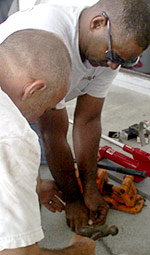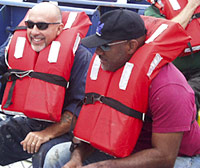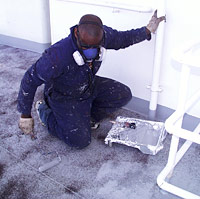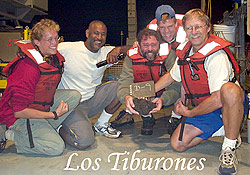|
|
Interviews: Able Seaman Butch Harty At 17, Butch Harty was struck with what he calls “wonder
lust.” He wanted to see the world. After graduating from high
school in Virginia, he joined the Navy and set sail. He made it as
far as Portland, Oregon. The ship he was assigned to had just returned
from Vietnam and was dry-docked for one year.
Butch stayed in the Navy until 1986, when he joined the Merchant Marines
- an organization of seamen who work on ships not related to the military.
Merchant Marines often are the sailors on cargo ships transferring
different types of cargo, such as grain, logs and oil. “It was
scary coming out of the Navy where we worked on 700 foot ships with
about 1500 people to an oil tanker roughly the same size, but with
only 18 people. When I first got on board and we met in the mess hall,
I said, “this is it? This is all of us?” Butch learned that
unlike the Navy, where multiple people took turns doing the same job,
on the oil tanker there were no back-ups. It was hard work, he says,
with no time to enjoy the different ports they visited around the
world.
He works for about four months at sea and then spends one to two months
at home in San Diego. “My wife, Delia, and I are comfortable
with this type of life. But it’s not a job for everyone. My son, Mark,
is 24-years-old and an electrician. He did four years in the Navy
and that was enough for him.”
Much of Butch’s inspiration to follow his dreams came from his grandparents.
“My grandmother was the head nurse during the first open heart
surgery,” he says. “When my grandfather was a child he
lived in the Virgin Islands, ran around barefoot and didn’t go to
school. When he was 13, he moved to Philadelphia where he worked
hard in school and earned a scholarship to the University of Wisconsin.
He then became a well-respected professor.” |
||||||||||
Mailing List | Feedback | Glossary | For Teachers | About Us | Contact
© 2010 Dive and Discover™. Dive and Discover™ is a registered trademark of
Woods
Hole Oceanographic Institution

 Butch works with Victor Barnhart, Bosun, to terminate the trawl wire.
Butch works with Victor Barnhart, Bosun, to terminate the trawl wire.

